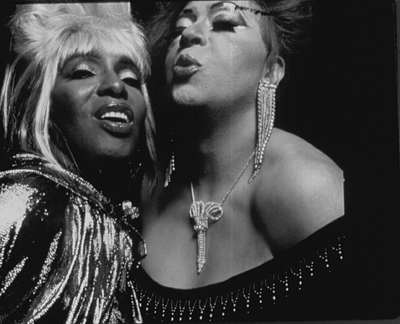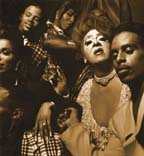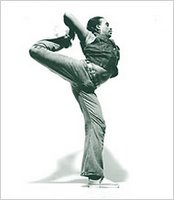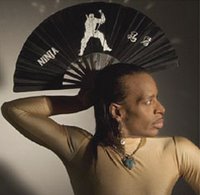
Ya wanna know what a House is?
I'll tell you what a House is!
A House is a gay street gang!
— Dorian Corey
In one of a seemingly recurrent series of waves around the blogosphere, several folks have taken up the question of blogging, somewhat connected to that old saw of pseudonymous blog identities. I tend to be somewhat resistant to memes, but as Maggie May says, “It’s like a meme, only longer.” Several threads work their way through the various conversations happening now and in the past around academic blogging, but the two that seem most prominent to me are community (with its shared root correlates communing, commune, common) and freedom of expression, the former linked more explicitly with blogging and the latter with pseudonymous practice. However, above all blogging tends to be a subjective art, resistant to analysis, so for any given blogger you'll get a number of different answers to the techne of blogging.

Suffice it to say, some of the thrill of blogging, with real names or otherwise, is the performative aspect, the choreographed maneuvers and teased hair and long fingernails of the star (all on our own little stages, which sometimes can give the blogosphere an atmosphere of a country sing-off with twenty or forty or one thousand stages, each belting out their own acoustically enhanced but generically different versions of Mariah Carey’s “Someday,” everyone pathetically trying to hit the high notes), the frisson of revelation, telling secrets, sharing stories (especially the juicy ugly ones), the transgression of the normative, which in the academic’s case, in particular junior faculty, is the very act of speaking itself. As I noted in a comment over at Chez Crazy, blogging is as much about performance and the pleasure of performance as anything else. In particular behind the scrim of a pseudonym, one can become larger than life, or at the very least one’s own life. Academics tend to be isolated, misunderstood by the hostile society that surrounds us, and treated with scorn. Our electronic selves can be glamourous, connected, and sophisticated. To perhaps push the allusion beyond what it is capable of, we become a bit like voguers, competing against each other and other Houses.
 And we do form Houses, loosely organised but collectives nonetheless. And, I would reiterate as well, competitive; granted a mild competitiveness, a small prize, but hits, comments, and readership count for most of us, even if we are loathe to admit it. Which ultimately is why commenting is de rigueur as a sort of social practice, an obligation of sorts, again a participation in community. Many a blog has sunk beneath the waves through being unable to generate readership. While I am sure there are lonely bloggers out there writing for themselves and happy that they and they alone know of their existence, for most of us, we write online to garner a public audience, a public presence, in short a readership, imagined or otherwise. This is only natural of course, for in some ways it is an extension of our professional selves, scribbling away in obscure journals for the few scholars who care to “become known,” to “make” our name, or the performance of teaching. Academic culture may be deeply socio-pathological, but we do have our talents. For example, have you ever thought that what most of us do for a living (public speaking, appearing before a constantly critical crowd, over and over again, year after year) absolutely terrifies most people? We academics are born for the stage, and most of us, if not all, love the limelight (and are constantly searching for a better stage, but that as they say is another story). Blogging can sometimes be understood as an extension, a flow, from this desire.
And we do form Houses, loosely organised but collectives nonetheless. And, I would reiterate as well, competitive; granted a mild competitiveness, a small prize, but hits, comments, and readership count for most of us, even if we are loathe to admit it. Which ultimately is why commenting is de rigueur as a sort of social practice, an obligation of sorts, again a participation in community. Many a blog has sunk beneath the waves through being unable to generate readership. While I am sure there are lonely bloggers out there writing for themselves and happy that they and they alone know of their existence, for most of us, we write online to garner a public audience, a public presence, in short a readership, imagined or otherwise. This is only natural of course, for in some ways it is an extension of our professional selves, scribbling away in obscure journals for the few scholars who care to “become known,” to “make” our name, or the performance of teaching. Academic culture may be deeply socio-pathological, but we do have our talents. For example, have you ever thought that what most of us do for a living (public speaking, appearing before a constantly critical crowd, over and over again, year after year) absolutely terrifies most people? We academics are born for the stage, and most of us, if not all, love the limelight (and are constantly searching for a better stage, but that as they say is another story). Blogging can sometimes be understood as an extension, a flow, from this desire. I’m not sure how we organise ourselves, since our Houses, as opposed to, say, the House of LaBeija or Xtravaganza, are even more interstitial and disorganised and inchoate. But there is a rationale, deep and powerful and perhaps unknowable in its pure subjectivity, that guides our blogging communities. We seem to have our "mothers," our "daughters," our grand prize winners and our supporters. To wit, have you ever noticed how blogging weblinks work? While some may attempt to maintain a catalogue raisonné of academic bloggers on their home pages, in actuality we tend to read and comment on those blogs that fall into one of our circles, and indeed I would say most of us read at most ten blogs (or less) regularly and in a dedicated way. Partially, of course, this is only human. While we may be eggheads, we aren't spider bots crawling the web for all content, and to encompass the totality of the academic blogosphere, which itself is fairly self-limiting yet still incredibly vast, is like the proverbial task of keeping up with work in one’s field. Eventually, you focus on the things you want to read and fake the rest (for instance, how many people have really, come on now, tell the truth, slogged through Empire? OK, The Fierceness read it, but that's like one out of a million!). About a month back I changed my blogroll, for the most part eliminating blogs that had disappeared or that I never read frequently, or that when I did read, had very little to say on, and also, to be frank, those blogs that I had linked to but after several months had never returned the favour (community, houses). I got to the point where I felt my blogroll was oppressing me, and I needed to clean house a bit. I have on occasion been startled to discover some corner of the academic blogosphere with very different links and connections from my own. I sometimes peruse these other sites, may read one or another for a bit, even add one to my blogroll, but return, for whatever reason, perhaps a homing instinct, to the handful of blogs, five or six, which first drew me back online, which I was visiting before I began blogging anew. My House.
I’m not sure how we organise ourselves, since our Houses, as opposed to, say, the House of LaBeija or Xtravaganza, are even more interstitial and disorganised and inchoate. But there is a rationale, deep and powerful and perhaps unknowable in its pure subjectivity, that guides our blogging communities. We seem to have our "mothers," our "daughters," our grand prize winners and our supporters. To wit, have you ever noticed how blogging weblinks work? While some may attempt to maintain a catalogue raisonné of academic bloggers on their home pages, in actuality we tend to read and comment on those blogs that fall into one of our circles, and indeed I would say most of us read at most ten blogs (or less) regularly and in a dedicated way. Partially, of course, this is only human. While we may be eggheads, we aren't spider bots crawling the web for all content, and to encompass the totality of the academic blogosphere, which itself is fairly self-limiting yet still incredibly vast, is like the proverbial task of keeping up with work in one’s field. Eventually, you focus on the things you want to read and fake the rest (for instance, how many people have really, come on now, tell the truth, slogged through Empire? OK, The Fierceness read it, but that's like one out of a million!). About a month back I changed my blogroll, for the most part eliminating blogs that had disappeared or that I never read frequently, or that when I did read, had very little to say on, and also, to be frank, those blogs that I had linked to but after several months had never returned the favour (community, houses). I got to the point where I felt my blogroll was oppressing me, and I needed to clean house a bit. I have on occasion been startled to discover some corner of the academic blogosphere with very different links and connections from my own. I sometimes peruse these other sites, may read one or another for a bit, even add one to my blogroll, but return, for whatever reason, perhaps a homing instinct, to the handful of blogs, five or six, which first drew me back online, which I was visiting before I began blogging anew. My House. For my part, I started to blog again, quite simply, because Mr. Gordo started a blog. This would be a very literal origin myth, but the reality is that I wanted, no needed, a platform for working out the terrible dreck that was my life in the aftermath of Sadistic College. In short, I wanted revenge, of sorts. It is not by accident that this blog started on the note of Sadistic College and continued in that vein for the first part of its life. Not only was this purging, literal and figurative, helpful personally, but it deeply informed the early work on the blog, leading to what I consider a series of very strong entries on various topics in the profession that, usually, had a sharp reference to Sadistic College someplace in the text. A big part of this was being able to tell the story, to relate the horror, while also being coy about the details. Some of you figured it out, but discovering the actual name of Sadistic College was a very small part of the revelation (Besides, everyone on the East coast already knows it sucks to work there; in fact, a small part of its regional fame is its deleterious working conditions). In point of fact it was more about being able to speak about that time and the college, period. The very act of speaking was what was so empowering. But as the blog progressed, I felt the desire to strike out at Sadistic College lessen, and the drive to comment more broadly on the profession and outside of the immediate context of the institutional horror of Sadistic College led the blog to another phase, which was also powerful, of meditative commentary. If one were to sit down and read this blog, which in just 71 entries (this is #72) has over five hundred pages of text on it (Microsoft Word, Times New Roman, double-spaced, which is how I compose my entries), one could see the trace of a larger personal movement and growth that was a function of the writing and blogging itself.
For my part, I started to blog again, quite simply, because Mr. Gordo started a blog. This would be a very literal origin myth, but the reality is that I wanted, no needed, a platform for working out the terrible dreck that was my life in the aftermath of Sadistic College. In short, I wanted revenge, of sorts. It is not by accident that this blog started on the note of Sadistic College and continued in that vein for the first part of its life. Not only was this purging, literal and figurative, helpful personally, but it deeply informed the early work on the blog, leading to what I consider a series of very strong entries on various topics in the profession that, usually, had a sharp reference to Sadistic College someplace in the text. A big part of this was being able to tell the story, to relate the horror, while also being coy about the details. Some of you figured it out, but discovering the actual name of Sadistic College was a very small part of the revelation (Besides, everyone on the East coast already knows it sucks to work there; in fact, a small part of its regional fame is its deleterious working conditions). In point of fact it was more about being able to speak about that time and the college, period. The very act of speaking was what was so empowering. But as the blog progressed, I felt the desire to strike out at Sadistic College lessen, and the drive to comment more broadly on the profession and outside of the immediate context of the institutional horror of Sadistic College led the blog to another phase, which was also powerful, of meditative commentary. If one were to sit down and read this blog, which in just 71 entries (this is #72) has over five hundred pages of text on it (Microsoft Word, Times New Roman, double-spaced, which is how I compose my entries), one could see the trace of a larger personal movement and growth that was a function of the writing and blogging itself. There are several things here I would like to briefly elaborate on. Firstly, the weblog as a form ebbs and flows, dependent on any number of factors: work, interest, personal life, readership, commentary and positive reinforcement, and the risk/reality of exposure or potential exposure (for pseudonymous bloggers). Secondly, their character changes over time, again in a myriad of ways: personal, professional, or more typically, a mix of both. Genre is important here, or as Bérubé would put it, raw or cooked. This blog has tended to be essay-based, and therefore on some level also self-selects its readers, to those who have the time and wherewithal to actually read it. Other academic blogs offer more brief entries, and therefore are more accessible to casual readers (and keeping more to the foundational semi-formal rules of the weblog genre). All blogs with longevity and the bloggers associated with them, regardless of genre, develop personae that can be thrilling, inspiring, banal, suffocating, or all of these qualities simultaneously. Blogs are rarely ourselves (as Professors X, Y, or Z) unmediated, transparent. They become a performance of self, a simulacrum, a scrim, an identity as much as any IRL (in real life). Who is Oso Raro? Who is he compared to the man who goes by another name in his professional and personal life? Likewise, who is Dr. Crazy, or Maggie May, Gay Prof, Flavia, Dean Dad, Bitch PhD, Sfrajett, Margo (Darling), Prof Grrrrl, Horace, Hilaire, and all the others, with our funny names and clever photos? And for that matter, who is Margaret Soltan, or Michael Bérubé, Tim Burke, and Erin O’Connor, who blog under their real names? Does the name make it real(er)? Get into the shoes and get into the pumps! Realness, and the performance of artifice, of fantasy, is yet another quality the academic blogosphere shares with the Harlem Houses. But who we are behind the façade is relatively unknown, as perhaps it should be. We may, on some level, want to know Flavia, or Gay Prof, or Bitch PhD, and indeed many of us have met, briefly or otherwise, or made strong connections in person, or IRL. But reality is not what determines our connections here. Realness does. And realness is different from reality in several key ways. Our floating electronic selves are what, largely, determines our affiliations, and in this vein I would also argue that there is a strong sense of projection and desire within both our online, electronic performances (for each other, ourselves, and lurkers/strangers) and our affiliations/identifications with other academic bloggers. Our bloggers.
There are several things here I would like to briefly elaborate on. Firstly, the weblog as a form ebbs and flows, dependent on any number of factors: work, interest, personal life, readership, commentary and positive reinforcement, and the risk/reality of exposure or potential exposure (for pseudonymous bloggers). Secondly, their character changes over time, again in a myriad of ways: personal, professional, or more typically, a mix of both. Genre is important here, or as Bérubé would put it, raw or cooked. This blog has tended to be essay-based, and therefore on some level also self-selects its readers, to those who have the time and wherewithal to actually read it. Other academic blogs offer more brief entries, and therefore are more accessible to casual readers (and keeping more to the foundational semi-formal rules of the weblog genre). All blogs with longevity and the bloggers associated with them, regardless of genre, develop personae that can be thrilling, inspiring, banal, suffocating, or all of these qualities simultaneously. Blogs are rarely ourselves (as Professors X, Y, or Z) unmediated, transparent. They become a performance of self, a simulacrum, a scrim, an identity as much as any IRL (in real life). Who is Oso Raro? Who is he compared to the man who goes by another name in his professional and personal life? Likewise, who is Dr. Crazy, or Maggie May, Gay Prof, Flavia, Dean Dad, Bitch PhD, Sfrajett, Margo (Darling), Prof Grrrrl, Horace, Hilaire, and all the others, with our funny names and clever photos? And for that matter, who is Margaret Soltan, or Michael Bérubé, Tim Burke, and Erin O’Connor, who blog under their real names? Does the name make it real(er)? Get into the shoes and get into the pumps! Realness, and the performance of artifice, of fantasy, is yet another quality the academic blogosphere shares with the Harlem Houses. But who we are behind the façade is relatively unknown, as perhaps it should be. We may, on some level, want to know Flavia, or Gay Prof, or Bitch PhD, and indeed many of us have met, briefly or otherwise, or made strong connections in person, or IRL. But reality is not what determines our connections here. Realness does. And realness is different from reality in several key ways. Our floating electronic selves are what, largely, determines our affiliations, and in this vein I would also argue that there is a strong sense of projection and desire within both our online, electronic performances (for each other, ourselves, and lurkers/strangers) and our affiliations/identifications with other academic bloggers. Our bloggers. But how can we know the Dancer from the Dance? Through October, both Mr. Gordo and I were both feeling a bit of blog fatigue, for different reasons. Primarily because, unlike the widespread notion of blogging, it is in fact work to maintain a blog. You must have an idea, execute it somehow, with an eye towards communication and community. This, on top of everything happening in one’s personal life, can be a struggle. For me, I think I was feeling a shift, linked to the purge of negativity that the blog enabled me to accomplish, the exorcism of the disgust and loathing left over from Sadistic College. What now? I don’t have an answer, partially because the way the blog developed (apropos to any blog I would argue) was unplanned and inchoate, a reflection of the real me as much as Oso the blogger, a strange mix of being aware of one’s presence online with the private pleasures of accomplishment and the constant risk of unmasking. When I revealed my blog to Advisor in October, he was unfazed, remarking, “That makes perfect sense. You have a blog sensibility and you always have.” I took this as a compliment. I know of some academics who would, in fact, have been offended. Is there a read there? I did not, however, offer him the URL, and he did not ask, curiously enough. In fact, much of my production (e.g. “work”) over the last eight months has been here, online and on this blog. Was this productive? Was it smart? Since it is not something that can be listed conventionally on a curriculum vitae, the answer for most academics would be a decided “no.”
But how can we know the Dancer from the Dance? Through October, both Mr. Gordo and I were both feeling a bit of blog fatigue, for different reasons. Primarily because, unlike the widespread notion of blogging, it is in fact work to maintain a blog. You must have an idea, execute it somehow, with an eye towards communication and community. This, on top of everything happening in one’s personal life, can be a struggle. For me, I think I was feeling a shift, linked to the purge of negativity that the blog enabled me to accomplish, the exorcism of the disgust and loathing left over from Sadistic College. What now? I don’t have an answer, partially because the way the blog developed (apropos to any blog I would argue) was unplanned and inchoate, a reflection of the real me as much as Oso the blogger, a strange mix of being aware of one’s presence online with the private pleasures of accomplishment and the constant risk of unmasking. When I revealed my blog to Advisor in October, he was unfazed, remarking, “That makes perfect sense. You have a blog sensibility and you always have.” I took this as a compliment. I know of some academics who would, in fact, have been offended. Is there a read there? I did not, however, offer him the URL, and he did not ask, curiously enough. In fact, much of my production (e.g. “work”) over the last eight months has been here, online and on this blog. Was this productive? Was it smart? Since it is not something that can be listed conventionally on a curriculum vitae, the answer for most academics would be a decided “no.” But this returns us to the communitas at the root of most academic blogging. We reach out to build community, to build bridges, to (only!) connect, in ways that are generally not approved in our home (real time) professional communities. Which of course is why blogging remains on some integral level both a) transgressive, and b) dangerous. But then again, community is not all hearts and flowers. It is work, and sometimes risky work. Which is why the “debate,” for what its worth, over pseudonyms and real names is both disingenuous and shockingly naïve. Of course most of us are masked: the risks to our professional lives are too great to be out, especially considering how hierarchical, judgmental, and snobbish academics can be. Online work does not (yet) have professional approbation.
But this returns us to the communitas at the root of most academic blogging. We reach out to build community, to build bridges, to (only!) connect, in ways that are generally not approved in our home (real time) professional communities. Which of course is why blogging remains on some integral level both a) transgressive, and b) dangerous. But then again, community is not all hearts and flowers. It is work, and sometimes risky work. Which is why the “debate,” for what its worth, over pseudonyms and real names is both disingenuous and shockingly naïve. Of course most of us are masked: the risks to our professional lives are too great to be out, especially considering how hierarchical, judgmental, and snobbish academics can be. Online work does not (yet) have professional approbation. At one point, over the summer at a BBQ with assorted folks from other universities here in Cold City, with people who knew I blogged and actually, embarrassingly, introduced me to some (non Cold City U) administrators as “the blogger,” it became clear that they didn’t consider it real, but rather thought of it as a bit of a joke, an idiosyncratic hobby, harmless and professionally useless. The casualness of their outing me as a pseudonymous blogger made that clear (in front of administrators, no less! I felt like Joan when she confronts Tina: "You deliberately embarrass me in front of a reporter! A reporter!"). Later, as I was attempting to communicate the importance, the vitality of online electronic life for myself as a writer and as an academic, to a crowd of skeptical and dismissive thirty- and forty-something academics, I turned to the teenaged daughter of one of the hosts and said, “They don’t get it, but you understand what I mean, don’t you?” And she nodded her head with a wry smile. Blogging, and the online communities we exist within, and the work (yes real intellectual work) that we are producing are the future. It may not be the only future, or keep its current form and shape, but it is where we will all end up one day. And in that sense, academic bloggers are truly transgressing, carving out new ground and territory for what will, sooner rather than later, be the space of the profession.
At one point, over the summer at a BBQ with assorted folks from other universities here in Cold City, with people who knew I blogged and actually, embarrassingly, introduced me to some (non Cold City U) administrators as “the blogger,” it became clear that they didn’t consider it real, but rather thought of it as a bit of a joke, an idiosyncratic hobby, harmless and professionally useless. The casualness of their outing me as a pseudonymous blogger made that clear (in front of administrators, no less! I felt like Joan when she confronts Tina: "You deliberately embarrass me in front of a reporter! A reporter!"). Later, as I was attempting to communicate the importance, the vitality of online electronic life for myself as a writer and as an academic, to a crowd of skeptical and dismissive thirty- and forty-something academics, I turned to the teenaged daughter of one of the hosts and said, “They don’t get it, but you understand what I mean, don’t you?” And she nodded her head with a wry smile. Blogging, and the online communities we exist within, and the work (yes real intellectual work) that we are producing are the future. It may not be the only future, or keep its current form and shape, but it is where we will all end up one day. And in that sense, academic bloggers are truly transgressing, carving out new ground and territory for what will, sooner rather than later, be the space of the profession.But, as we know only so well, no good deed goes unpunished.



11 comments:
I blog because it makes me feel good especially on football Saturday! :)
I, too started a blog because Mr. XX did. It was, let's see, how do you set one of these up? And presto. I wish I'd had one in the days of my Stepford College: it was just what I needed. And it would be really funny to read now, the place was so surreal. But one of the things I am doing in the blog is reclaiming myself from a different set of body-snatchers.
A lot of my education - arguably the best part of it - was garnered by reading Latin American Sunday papers, where professors wrote the articles. Journalistic pieces, chronicles, etc., but reflective, educated ones. It's part of their role. It's sort of expected. I think the blogs are a bit like that.
Otherwise, you can have an academic life, and a scholarly one, but it seems sort of asceptic. I end up feeling more like a technician than an intellectual.
Before the blogs, a friend and I used to self-publish these sort of 'zines, on regular paper, nothing at all fancy, and just leave them on newsstands and in cafes. Guerrilla cultural activity of sorts. Anything to connect.
I love the idea of bloggers constituting their own Houses--where realness, or the performance of a certain kind of reality, is more important than reality itself.
I love this post. Like Flavia, I really respond to the notion of the House - I have wondered, incoherently, about exactly *what* kinds of things it is that lead me to feel an affinity and devotion to certain bloggers.
I also appreciate the way you mention colleagues' and others' casualness with the fact of you as a blogger. I find this hard to take. As I am always having to say about my academic research, this is *not* trivial. It matters. I have felt that particularly keenly of late, when things feel so ridiculous in my personal life, and bloggers are some of the only people to whom I have revealed the problems. In a sense, I think blogs allow us to be more authentic (to use an unfashionable word), even through our performances of self. Collapsing the boundary between performance and authenticity.
Terrific post, as always.
If I had a nickel for every time I've been compared to Pepper LaBeija...
Although this is an excellent post, it overlooks one problem. What of those academic types who only have a blog identity? I know of at least one case where the blogger likes to talk about research and other professional stuff, but does not actually do any research, or at least, has nothing that appears in print (at least not this Century). This, it appears to me, is one of the down side of the blog phenomenon. A failing academic can get their ego massaged by their blog, thereby reducing or removing their motivation to do real academic work. This is a pernicious phenomenon.
It seems that my institution may be taking this problem in hand, with post-tenure review. However, it does not help those who are afflicted by this difficulty. I have tried to assist with a couple of cases, but to little effect. So, I think that an academic 'health warning' should be issued with this post.
The CP
Hola,
I'm not sure I understood the pevious comment posted by the CP. What is "real" work? Empire?
Check this link from the NY Times
http://www.nytimes.com/2006/11/22/education/22blogs.html?ei=5070&en=e189e8ac271db756&ex=1164862800&adxnnl=1&emc=eta1&adxnnlx=1164222136-b/Adt6N7xv9f84Z04BW1sg
Happy Holidays (real Holidays, I mean)
God, I'm glad they finally put Paris is Burning on DVD.
I'm also glad I made the blogroll cut!
Oh yeah, and what you see of me on my onymous blog is very little of Me.
Thanks for this clever reflection on blogging. It perfectly encapsulates my unexpressed feelings about blogging, as it occasionally threatens to overtake the work I am paid to do. The analogy to sexually transgressive performance art was disturbing but probably appropriate.
As usual I am going to have to high step it from shower, to turnpike, to work because I have spent an extra 20 minutes reading your blog, checking out links, stopping to ponder, and all that "such and such".
A quick note. I developed my blog because I could not be the real person I choose to become in the university (I stopped and am starting back). And ironically, I see that I am not "allowed" to be that person now because of some of the stupid social rites the book business seems to ordain.
So Littlemilk is the person I am in my civilian clothes, before I have to turn into a New Negro and dance on the ballroom floor with minons of old school race warriors, bad toothed septarians, and holy theory harlots watching from the sidelines.
Blogging, and the online communities we exist within, and the work (yes real intellectual work) that we are producing are the future. It may not be the only future, or keep its current form and shape, but it is where we will all end up one day. And in that sense, academic bloggers are truly transgressing, carving out new ground and territory for what will, sooner rather than later, be the space of the profession.
These are some of the sentences in here (some of the many) I find most interesting. No good deed goes unpunished, wise phrase. However.
Post a Comment